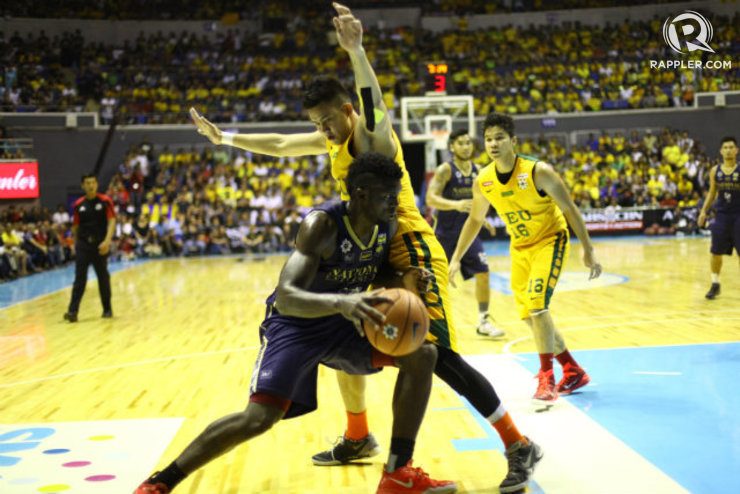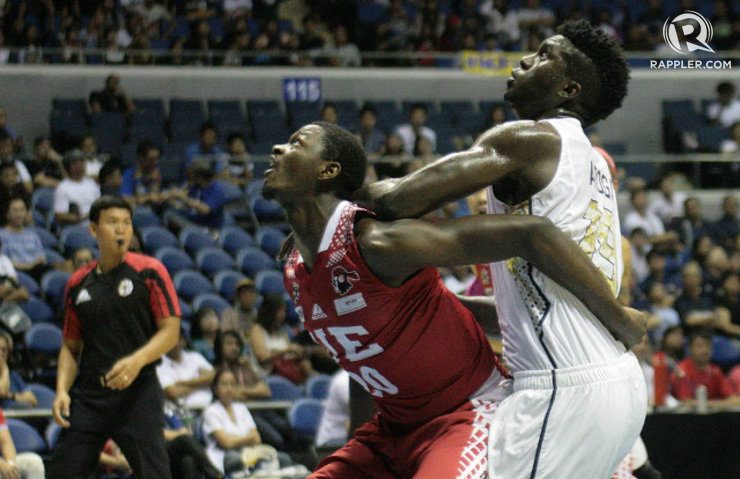SUMMARY
This is AI generated summarization, which may have errors. For context, always refer to the full article.

MANILA, Philippines – Alfred Aroga stood on top of the podium, insisting he hasn’t changed.
Nearly two months after delivering National University their first UAAP men’s basketball championship in 60 years and taking home the finals MVP as a rookie, Aroga was declared by Philippine sportswriters 2014’s UAAP Pivotal Player of the Year.
“How has it been since winning the championship?” the night’s host, UST courtside reporter Kristelle Batcherlor asked him. With a room full of spectators in the restaurant anticipating his answer, he replied, trophy at hand: “I’m still the same guy.”
He’s still the same person he was when he first came to the Philippines from Cameroon in 2011, he says: hungry to get better, eager to work hard, and happy to receive an education. One of the few differences now is that his name will now forever remain affixed with words like “champion” and “MVP.”
Did it bother anyone that he won the award despite being a foreign student-athlete who has seemingly superior athleticism? It certainly didn’t seem that way.
Aroga is adored by National University, liked by the media, and appreciated by the public because he works hard, stays humble, and didn’t parade his talents around the moment he reached Philippine soil. And that won’t change anytime soon.
But celebrating UAAP foreign student-athletes rewarded for their sacrifice and commitment? It looks like those days are numbered.
The UAAP is moving in a direction where foreign student-athletes will eventually no longer participate in the league. Starting next year, Season 78, only one foreign student-athlete will be allowed in uniform per team, as opposed to the two allowed players in recent years.
Recruitment of foreign student-athletes will be discontinued by next year. All those who were recruited prior and have or are serving residency will be allowed to play their remaining eligible years, but in a few seasons time once they’re all done with their college careers, the UAAP will be foreign student-athlete free.
“I don’t really try to comment any kind of comment on that topic because it’s really sensitive,” Aroga told Rappler moments after receiving his award during the 2014 Collegiate Basketball Awards night.
“I really have nothing to say about it. Why? Because first, I’m a foreigner in this country. So no matter what I say, no matter what I’m going to do it has no impact. Why? Cause I’m a foreigner.
“We just have to follow the rules of the country and the UAAP. They want to ban foreigners, then it’s the decision. As a foreigner, I just respect it. But I feel a bit bad because we’re not just basketball players, we’re students too.”
What’s most irking about the new rule of the UAAP is that it denies foreigns students from receiving an education.
When local student-athletes leave the UAAP, they have a chance to be drafted in the PBA, allowing them a career past college in basketball. For the foreigners? Once the UAAP is over, the most they can go to is the PBA D-League. They won’t be allowed in the PBA unless they’re recruited to be imports, which is a long shot considering the vast competition.
Some of these kids come from rough backgrounds, using the UAAP as an opportunity for a better future. Earning a degree could lead to jobs in the corporate world or other fields outside of hoops. Does it sound fair to keep them from attaining an education just to give an extra slot or two to other Filipino student-athletes?
“Cause, actually, you see today, we’re champions. Even the bench players that graduated, they have opportunities… and we’re happy [for them]. We’re just going to stop in the UAAP, and they’re going to go to the PBA,” said Aroga.
“The thing is, it’s not about the foreigners. It’s about hard work really paying off. When I came here, I didn’t really know how to play basketball. I had to work so hard. The Philippines gave me the opportunity to express myself on the court, to be known a bit, but it has nothing to do with taking space.”
Each UAAP men’s basketball team allows 16 roster spots. In most cases, 15 of those already belong to Filipinos. The UAAP wants to stop the practice of utilizing foreign student-athletes to give more opportunities to the locals, when nearly 90% of teams are already comprised of Filipino student-athletes.
In the United States, Japeth Aguilar was given a spot to play for Western Kentucky, and it didn’t seem like anyone was complaining that he took an American’s spot. Kobe Paras, assuming things to go as planned, is going to become a UCLA Bruin. How would it make Filipinos feel if he was banned?
It doesn’t make the Philippines look good as well when other potential foreign student-athletes from Cameroon or anywhere else find out they won’t longer be allowed.
Money isn’t a factor as well, Aroga says: “As far as money is concerned, I don’t know what, because me, seriously, in NU, the money thing is nothing in the school there. We don’t talk about money there. We talk about studies and basketball.”
Truth be told, foreign student-athletes have upped the level of play and popularity of the league over the past few years. Sure, social media and networking have played major roles as well. But consider the teams that have become relevant because of foreigners.
Since Paul Lee left in 2010, UE hasn’t made the Final Four. But in the past two years, they’ve been contenders for the playoffs thanks to Charles Mammie, even winning the FilOil preseason tournament in 2013. NU went from league doormat to champions in a matter of season thanks to guys like John Mbe and Aroga. UST made back-to-back finals appearances from 2012-2013. Would they have accomplished that without Karim Abdul?

La Salle and Ateneo have an advantage with recruiting top high school stars because of their reputation and successful basketball program histories. High school standouts often admit they prefer to go to the two schools because of education. Other schools use getting foreign student-athletes as ways to level the playing field, and it’s helped keep them on the same playing field. Now, even the Green Archers and Blue Eagles have incoming foreign student-athletes in Season 78.
If those foreigners increase the level of play in the league and challenge locals to improve their game, why stop it?
The UAAP has this all wrong. The league is adored by many; no Philippine sporting event can surpass the feeling of going to the Big Dome or the MOA Arena, chanting with the beat of the drums, and cheering your heart out for your alma matter.
But it has its many flaws too. Every year, one of the eight participating schools hosts the league. Every year, there’s a new commissioner. Almost every year, rules and regulations are altered.
In Season 76, the UAAP board and its 16 members were in charge of coming up with key decisions to improve the league. In Season 77, all the power was handed to the commissioner.
Shouldn’t it be time for the UAAP to find a governing body to handle the league, season by season, with the same commissioner holding his post every year? This isn’t to bash prior commissioners and the way they handled the league; it’s just time for more consistency.
“I will always just say I respect the decision though,” Aroga said. “I just respect the decision of the Philippines and the UAAP and that’s it.”
Aroga is correct. He remains as respectful and as humble as he did when he first got to the Philippines. He remains a kid who just wants to work hard, prove he isn’t just taking up space, and maybe deliver National U another title or two in his two remaining years with the team.
Because of that, Aroga won’t say it, so I will instead.
What the UAAP is doing isn’t fair at all.
– Rappler.com
Add a comment
How does this make you feel?
There are no comments yet. Add your comment to start the conversation.